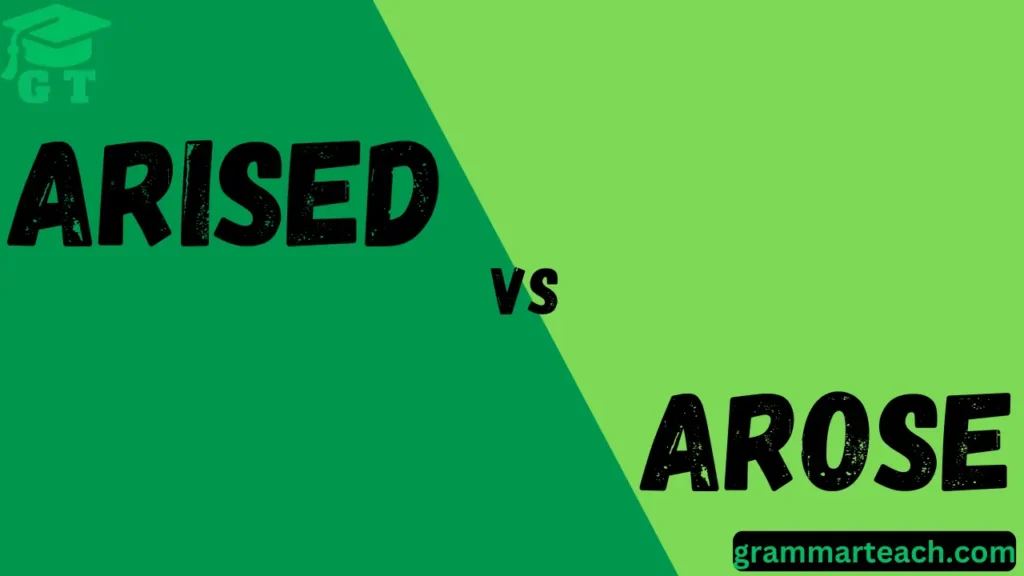Have you ever found yourself wondering whether to use “arised” or “arose”? This is a common confusion for many English learners and even native speakers. The past forms of “arise” can seem tricky, but understanding them is key to proper grammar. The question “Is it arised or arose?” often arises because “arise” is an irregular verb, meaning it doesn’t follow the typical past tense rules.
In this article, we’ll clear up the confusion between “arised” and “arose.” We’ll explain their meanings, show examples of how to use them, and provide useful tables to make learning easy. By the end, you’ll know exactly which one to use and why!
Arised vs Arose – What’s the Difference?

People often get confused between “arised” and “arose” because they look similar and sound like they could be correct. But only one of them is actually right! Many English learners, and even some native speakers, make this mistake. So, let’s break it down and understand why.
What Is “Arose”?
Definition: “Arose” is the past tense of “arise.” It means “to happen, appear, or come up.” This verb is commonly used to describe situations where something unexpected or new occurs.
Usage in Sentences:
- A new idea arose during the class discussion.
- A problem arose when the computer stopped working.
- A conflict arose between the two teams over the final score.
- Interest in the topic arose after the documentary was released.
Where Do We Use “Arose”?
- In formal writing (books, news, business reports).
- In everyday speech when talking about something that happened.
- In past tense sentences when referring to events or issues that occurred.
- In historical and academic contexts when discussing past events.
What Is “Arised”?
Is “Arised” a Word? No, “arised” is not a correct word in English. Many people mistakenly believe it is the past form of “arise,” but that is incorrect. This is a common error made by English learners who assume “arise” follows regular verb rules.
Why Is “Arised” Incorrect?
- “Arise” is an irregular verb. It does not follow the usual “-ed” rule for past tense verbs.
- The correct past tense is “arose.”
- The past participle form is “arisen.”
- Unlike regular verbs like “arrive” (arrived) or “decide” (decided), “arise” has its own unique conjugation.
By learning this difference, you can avoid making mistakes in both speaking and writing!
Read More: Segway vs Segue: Easy Guide to the Right Word & Meaning
Quick Comparison Table
| Word | Is It Correct? | Meaning | Example Sentence |
| Arose | ✅ Yes | Past tense of “arise” | A question arose in the meeting. |
| Arised | ❌ No | Incorrect word | ❌ The problem arised last night. |
Key Differences Between “Arose” and “Arised”
Let’s compare them side by side to make things easy to understand:
| Aspect | Arose | Arised |
| Definition | Correct past tense of “arise” | Incorrect word |
| Common Usage | Used in stories, articles, and daily speech | Not a real word |
| Context | Found in books, reports, and conversations | Should not be used |
| Grammar Role | Verb (past tense) | Incorrect form |
| Common Mistakes | None, when used correctly | Often used instead of “arose” by mistake |
Example Scenarios to Illustrate the Difference
Here are some simple examples to show how to use “arose” correctly:
| Scenario | Correct Sentence | Incorrect Sentence |
| Talking about a problem | A problem arose when the lights went off. | A problem arised when the lights went off. |
| Discussing an opportunity | A great opportunity arose for me to travel. | A great opportunity arised for me to travel. |
| Describing a conflict | A fight arose between two players. | A fight arised between two players. |
Why Do People Confuse “Arose” and “Arised”?

Here are some common reasons:
- Irregular Verb Confusion: Many people think “arise” follows the regular verb rule and add “-ed.” Since many verbs in English form their past tense by adding “-ed” (like “walk” → “walked”), learners assume “arise” follows the same pattern.
- Similar Words: Words like “rise” (rose, risen) sound similar and cause confusion. Since “arise” and “rise” both involve movement or change, people mistakenly apply the same past tense pattern.
- Not Used Often: “Arose” is not a word people hear every day, so they guess the wrong form. Many English speakers encounter “arise” mostly in literature or formal writing, making them unfamiliar with its correct past forms.
- Influence of Other Irregular Verbs: Some irregular verbs, like “drive” (drove, driven), make it difficult to remember the correct pattern for “arise.” The variety of verb conjugations in English adds to the confusion.
- Regional Variations and Slang: In some regions or informal settings, incorrect verb forms like “arised” might be used colloquially, reinforcing the mistake.
Synonyms & Antonyms
To further clarify, here are some words related to “arise” and “arose”:
| Word | Synonyms | Antonyms |
| Arise | Emerge, appear, occur, happen | Disappear, vanish, cease |
| Arose | Developed, originated, sprang up | Ended, stopped, faded |
| Arisen | Surfaced, come up, manifested | Died down, dissolved, subsided |
Read More: Cacoon or Cocoon? The Correct Spelling & Meaning Explained
Final Thoughts
Understanding the difference between “arised” and “arose” is essential for proper English usage. Remember, “arose” is always the correct past tense of “arise,” while “arised” is a common mistake that should be avoided. By practicing the correct verb forms, you can improve your writing and speaking skills.
In daily conversations and formal writing, using “arose” correctly will help you sound more fluent and grammatically accurate. Keep in mind the proper verb conjugation—Arise (present), Arose (past), and Arisen (past participle)—to ensure you’re always using the right form. By making these small adjustments, you’ll avoid common errors and communicate more effectively!




